Percy ~ PZ.614 ; 1907-1916
ex Annie Jane ~ PZ.614 ; 1897-1907
Percy ~ WY.? ; 1916+
Percy was built by William Peake and his sons at Newlyn in 1897, and worked out of Newlyn as the first class Mount’s Bay lugger Annie Jane, from 1897 to 1906, in the late summer of 1906 ownership of the Annie Jane passed to Harry Percy Laity (32) [known as Percy], & George Laity (58), of Fore St., Mousehole, when she was registered in their name in the Penzance Register of Sea Fishing Boats, on September 8th with Harry Percy Laity as her skipper.1 The Laitys also owned another fine 1st class lugger at this time – the Edgar, of which George (the father) was skipper – and her story is told in another of this series of fishing boat histories.
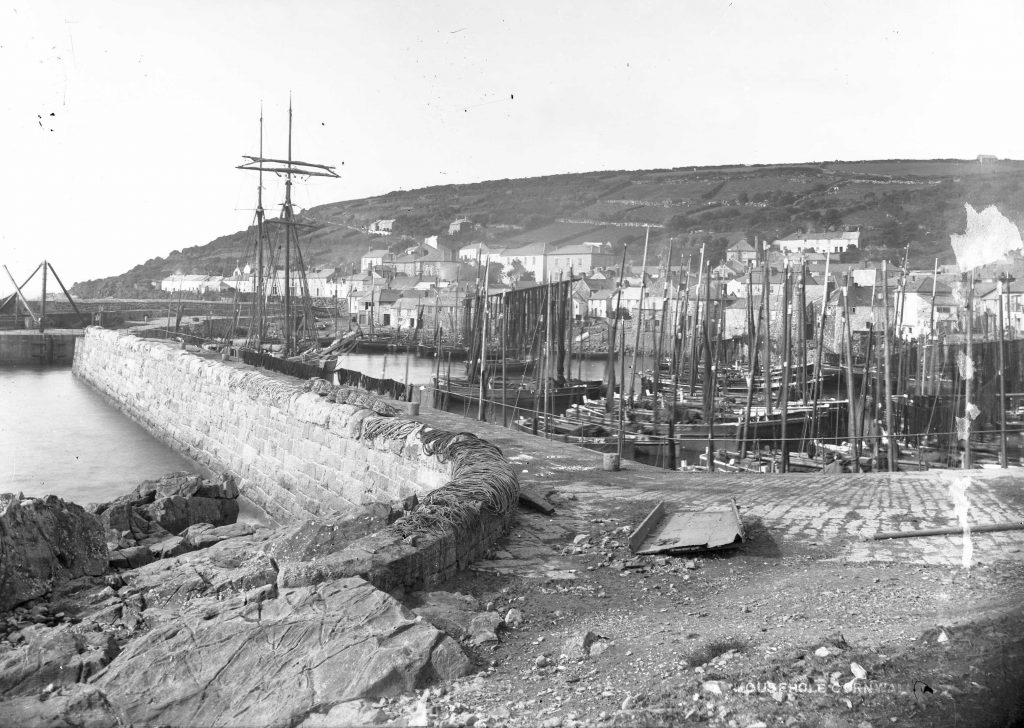
Note the stone loading chute in the foreground. Crushed stone from the Penlee Quarry, was still being exported from Mousehole at this time.
Early in February 1907, the Laitys cancelled the registration of their older lugger Percy~PZ.30, and she was broken-up. Just over a week later, on February 15th 1907, a few months after the removal of the Annie Jane from Newlyn to Mousehole, the Laitys renamed her Percy, when she retained her current fishing number – PZ.614. As the Percy she continued to work out of Mousehole, under sail, for the best part of another ten years, and for the first six of these with Percy Laity as her skipper.
Reports of her fishing during this period were a little more frequent than in previous decades, as the Annie Jane, but were still quite patchy. The dwindling number of Mount’s Bay mackerel drivers, still working under sail, was causing some concern in the fishing communities. Thus the local press gave them a little more attention – though these reports were submitted by local correspondents, as the papers did not employ reporters. A report in May said:
MOUSEHOLE: Thursday afternoon the Mousehole boats Percy and Maggie arrived from Scilly with Tuesday’s fish on board. After a very rough passage the boats arrived safely.
The fishing boat Vesta was the only Mousehole boat which remained at Scilly over Sunday. By so doing she was able to get on the fishing ground for Monday night, and on Tuesday morning came into Scilly with 14,000 mackerel, which realised 6s. 6d. per 120.
Most of the mackerel fleet are in Scilly wind-bound. Those that shot their nets on Tuesday evening had a rough time, but some of them were well fished, several having from 10,000 to 5,000. Some of the boats have made for Newlyn, others went to Scilly. During the day boats were coming, but principally steam drifters; the smaller boats (Bay boats) seemed to be making just as good weather of it as the larger ones, The piers at Mousehole were swept from end to end and during the morning of Wednesday the baulks were put down in order to secure the craft in harbour.
Cornishman, Thursday, May 16th, 1907
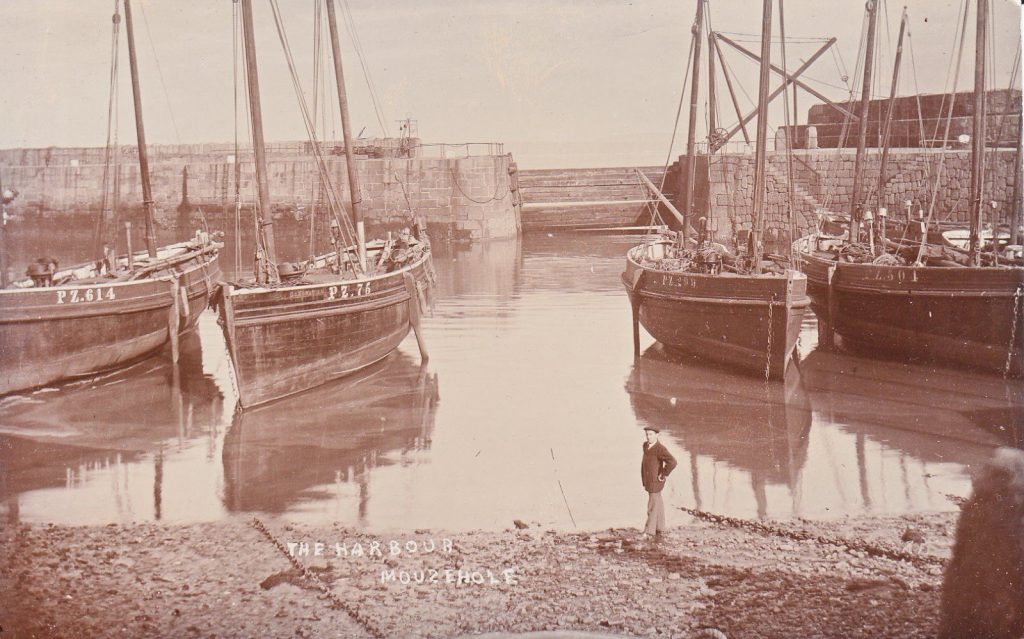
The baulks did not turn Mousehole into a dry dock but protected the boats from the swell. In July:
MOUSEHOLE: The majority of the mackerel boats have laid up and the men are busily engaged in rigging our the small boats for the pilchard fishery.
The crews of the Orlando, Edgar, Ben-my-chree, Percy, Hopeful, Maggie, Emblem and Children’s Friend, are getting ready for the North Sea herring fishery. These are the only boats from this port that are going North this year.
Cornishman, Thursday, July 11th, 1907
However, by 8th August:
MOUSEHOLE: The fishing boats Maggie, Orlando, Ben-my-Chree, Edgar, Emblem, Percy, Children’s Friend, and Hopeful, which left Mousehole on Friday morning for Scarborough, arrived at that port on Monday evening, having had a very quick run. We wish them a successful herring season.
Cornishman, Thursday, August 8th, 1907
They must have moved fast for a week later:
MOUSEHOLE: Good accounts reach us from Scarborough, and there seems to be every likelihood of a successful herring season. Last week the Percy made over £50, and many of the other boats from this port did fairly well.
Cornishman, Thursday, August 8th, 1907
The boats were home again for Paul feast, with nothing more being said about their season in the north, and after a few days at home they were off once more to Kinsale and the Irish mackerel grounds. A November report said:
MOUSEHOLE: Two boats more left for the Irish fishery this week, the Jonadab and Percy.
Cornishman, Thursday, November 7th, 1907
Three weeks later, it was reported that:
MOUSEHOLE: The Mousehole boats Edgar and Jonadab that went to Ireland to fish for mackerel have been very unfortunate in not having taken any or scarcely any fish, and are daily expected home.
The three boats Percy, Jonadab, and Edgar, which have been fishing on the Irish coast for the past four weeks, returned to Newlyn on Friday morning, after a rough passage across.
Cornishman, Thursday, November 28th, 1907
The 1908 mackerel season was nearing its conclusion before we hear of the Percy again. A report in May 1908 said:
MOUSEHOLE: On Tuesday evening the Percy, Coronation, and Hopeful landed from 500 to a 1,000 mackerel per boat, which realised from 9s. to 10s. per 120.
On Wednesday morning the weather having moderated a little the Children’s Friend, Valorous, Jonadab, Velox, and Maggie put to sea, but towards evening the wind freshened and they had to go into Scilly. They shot on Thursday and Friday nights and arrived home on Saturday evening with catches varying from 900 to 3,000 per boat, which realised from 9s. to 11s. 6d. per 120.
The fishing fleet is gradually diminishing here. The Sobaron, owned by Mr. Charles Pezzack, was taken to Marazion beach on Monday morning by Messrs. Richard James Harry and George Edward Quick to be broken up for firewood, having been purchased by a general dealer. This is the fourth boat gone from Mousehole this season, the three others being the Minerva and Genesta, to Scilly, and the Miranda to Ireland. A few years ago there were over 60 mackerel drivers, and now there are about 30.
Cornishman, Thursday, May 14th, 1908
By the end of June:
MOUSEHOLE: About a dozen boats arrived on Thursday with catches from four and a half thousand down to a few hundreds. The Emblem, Ben Ma Chree, Children’s Friend and Percy, each had four thousand and or over. The boats that were in in time to serve the midday train made more of their fish than the others. Prices ranging from 9s. to 7s. 6d. per hundred.
The Mousehole boats Lizzie, and Ibex have gone to Ireland to fish, word having been sent that good fishing was to be had there.
On Wednesday the Velox, Coronation, and Smiling Morn, landed catches of mackerel varying from fifteen hundred to two thousand per boat, and on Thursday the Percy and Emblem landed four thousand per boat. The fish realised from 9s. to 9s 6d. per 120.
Cornishman, Thursday, June 25th, 1908
On the close of the mackerel season a few of the boats intended to go north again. By mid-July it was reported that:
MOUSEHOLE: Mousehole’s mackerel fishery for the season ended up on Sunday, when the last of the boats arrived late, with several thousands of mackerel, which were sold for manure, at the rate of 10s. per 1,000. The fish are of excellent quality, but so far off that the sailing craft are unable to bring them to market unless iced, consequently the season has closed.
The fishing boats Our Maggie, Percy, and Edgar, which were to have gone to the North Sea herring fishery, are compelled to lay up for want of crews. Most of the men prefer fishing at home for pilchards. About seven boats are preparing for the North Sea, and will be leaving when ready.
Cornishman, Thursday, July 16th, 1908
Percy was fishing once more during the 1909 mackerel season, but did not get noticed as such until the early season was nearing its close.
MOUSEHOLE: Three or four Mousehole boats fishing near Scilly on Thursday evening fell in with a few mackerel of good size. The Gleaner had 1,400, the Percy and Velox about 1,000 each. Owing to the light winds at the time the boats did not get in until Saturday morning. The fish were sold for 17s. per hundred.
Owing to the calm weather on Saturday last the fishing boat Ibex did not arrive from the fishing ground till Sunday noon. Such a thing is a rare occurrence at this time of the year.
The spring mackerel season which has just drawn to a close has been the worst ever remembered. The crews of the various boats are busy getting on boars their summer nets preparatory to making a trial in deeper waters.
Cornishman, Thursday, April 15th, 1909
Fishing in deep water to the west of the Scillies, there were anxious times at home when a May gale swept through, and the Percy was one of the local boats caught at sea.
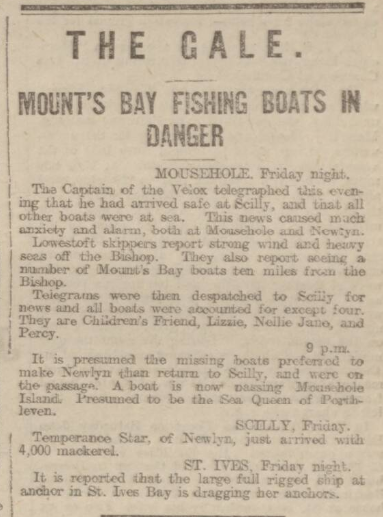
The overdue boats must have survived the ordeal, as their fishing registers remained open, but there was no report of their safe return, and in the case of the Percy, we next hear of her that winter.
THE HERRING FISHERY: The weather of the past two days has somewhat retarded the prosecution of the herring fishery out of Newlyn, most of the boats remaining in harbour on Thursday and Friday.
Only two boats proceeded to sea from Mousehole on Friday, the Jonadab, and the Percy. They both returned to Newlyn Harbour on Saturday morning, the former having caught 1,600, and the latter one last (10,000). The price realised was 3s. 6d. per 126.
The Expert, of Newlyn (Thomas Barnes, master), landed three lasts at Padstow on Saturday.
We understand that the Jonadab has earned £190 during the week, whilst the crew of the We’ll Try, have earned £30 per head.
Mount’s Bay craft at Padstow are still securing fairly good catches of herrings. On Monday there arrived a Scotch steam herring drifter, the Pitgaveny, Inverness. She is a vessel specially built and equipped for this trade and capable of remaining safely at sea in all weathers, The ship has had great success, landing in four nights fish which sold for a total of about £400. On Thursday she landed an enormous total of about 200,000 fish. Dealing in these huge quantities the fish cannot be counted [in hundreds], as is the local custom, but are sold in crans. Altogether on Thursday, 500,000 fish were landed at Padstow, and sold at prices from 30s. to 32s. per 1,000. The buyers had a bust time, and a special train was necessary to take the fish away. About 80 tons of fish were dispatched.
Cornishman, Thursday, December 16th, 1909
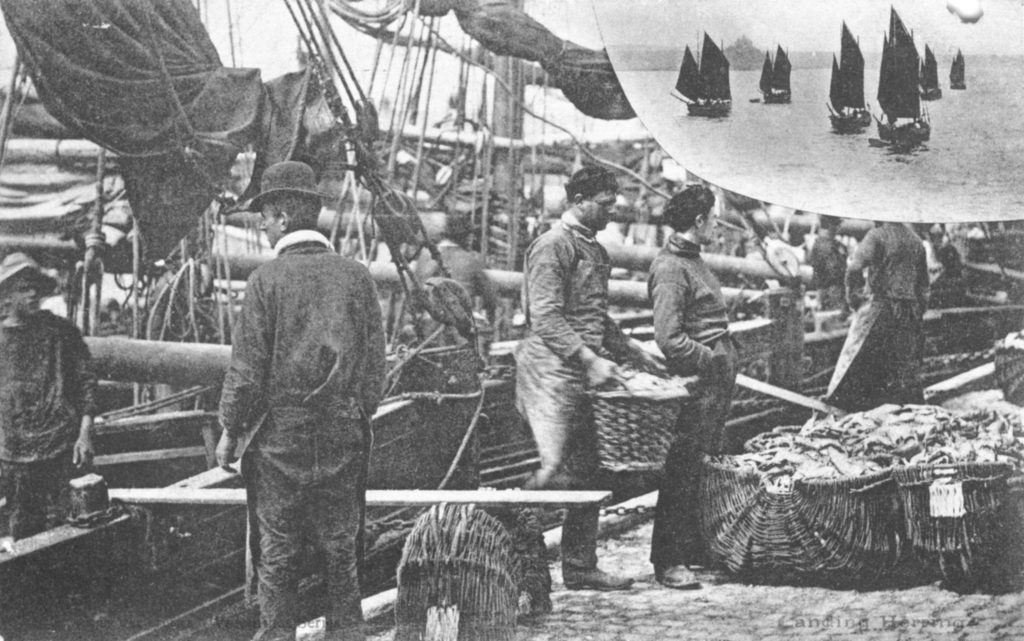
A couple of weeks after the previous report, at the end of December it was reported that:
MOUSEHOLE: The herring fleet were all out early on Monday morning, but were not generally well fished, the majority of the boats had but very little. The Forget-me-Not (Captain S. Blewett), had two lasts. The Nellie Jane, well on for two lasts. These were the best shots. On Tuesday the fishery was altogether light, from a few hundred down to nothing. During the early morning the weather became bad and all the boats had difficulty in getting in. The Percy had a narrow escape from serious damage. The Emblem had also a trying time, being held in the gap with four warps, two from either pier. Eventually the boats were all got in and the baulks were at once out down, which kept the harbour quiet, though the seas were breaking over the pier and flying in over the houses.
Cornishman, Thursday, December 30th, 1909
Given that the seas were breaking over the harbour wall, and the pier-head crane had to be worked manually by several men when setting the baulks across the harbour mouth, the work must have been extremely hazardous on occasions.
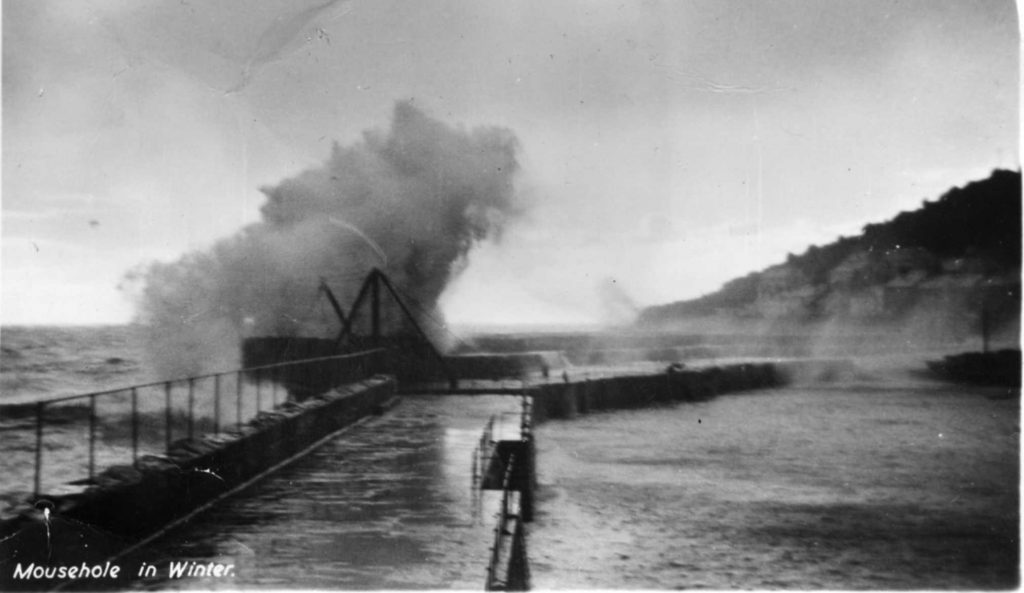
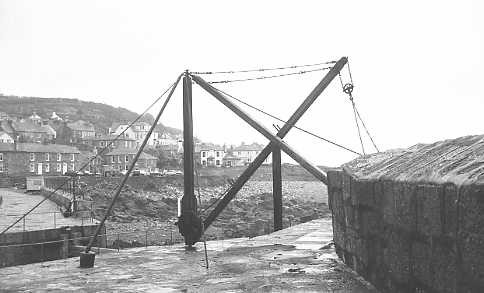
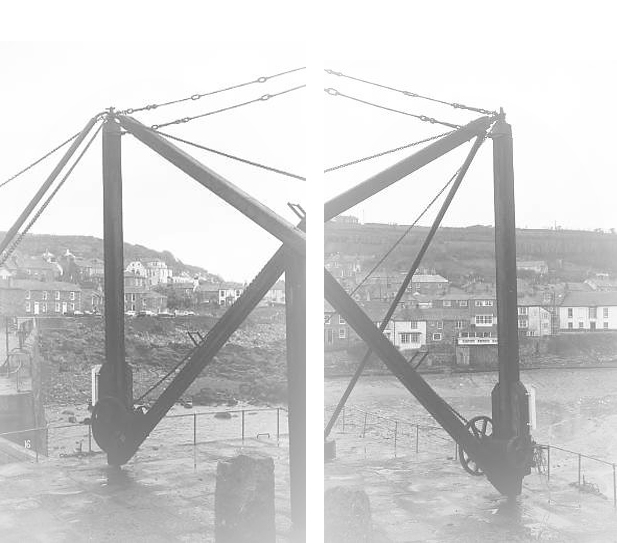
Our lugger was active again in the 1910 mackerel season:
MOUSEHOLE: Mackerel fishing was with a few Mousehole boats more successful on Thursday. The Valorous took 5,400. The Percy somewhat later came in with from 8,000 to 10,000. Several other boats had fairly good catches, while some had only a few hundred.
Cornishman, Thursday, April 7th, 1910
But we don’t hear of her again until the winter herring season. In November:
MOUSEHOLE FISHERMEN’S ALARMING EXPERIENCE: The experiences which the crews of six first-class luggers underwent on Friday night will long be remembered as the bitterest in their lifetime. The drifters Nellie Jane, Maggie, Emblem, Children’s Friend, Jonadab and Percy shot their gear further to the westward than the remainder of the fleet, and were somewhat later in hauling their nets than other craft. Before half the trains had been recovered it was found that the tide (which was like a mill race) was fast driving all the boats towards the Cairn and Runnel Stone ledges. Three out of the fleet just managed to secure the last net and clear by an ace of the dreaded shoals. The Nellie Jane’s crew were forced to cut away eight nets, and were soon followed by the Jonadab. Within a few seconds, amid tremendous seas, the crew of the Nellie Jane noticed six men in a small punt, who they soon discovered were the crew of the lugger Percy. The latter crew, whose boat was in a more dangerous position, expecting that their craft would every moment be dashed against one or other of the ledges, when there would be no hope of saving life, took to their small boat. The men had their eyes on the Percy, and for a short time there was great suspense. Soon it was observed that instead of striking the rocks she was being swept through the narrow channel between the Runnel Stone and the Cairn, into deeper water to the westward. The men pulled with vigour, and succeeded in regaining the deck of their lugger. The other boats stood by for a while to render any assistance necessary, and, when the signal was given “all well,” efforts were made to recover all nets that were cut away, and were happily recovered.
Cornish Telegraph, Thursday, November 17th, 1910
The crew were very fortunate indeed to be able to re-board their drifting lugger, and the Percy to survive running the gauntlet amongst the stones.
MOUSEHOLE: Owing to the light winds the Percy, Valorous, and Nellie Jane did not arrive from the fishing grounds till Sunday afternoon. They had catches of mackerel varying from two to four thousand per boat.
The calms and light winds during the past week have been detrimental to the fishing industry. It has taken the boats such a long time to go to and return from the fishing ground that at the most they can only have two or three night’s fishing in the week, consequently very little money has been earned.
Cornishman, Thursday, June 8th, 1911
No reports of the Percy have been found in 1912, and it was not until December 1913, that we hear that Percy Laity had applied to the Cornwall Sea Fisheries Committee, for a grant from the development fund ‘for the installation of a motor in his fishing boat, which had a 46ft. keel and was suitable for that purpose.’2 Unfortunately the report does not mention which boat he was referring to – though with a keel of 46 feet, it was probably the Edgar. However, a decision on the application was not made at that meeting, which left the application to be dealt with by the new committee appointed to deal with such grants.
Percy Laity was now skipper of the Edgar and in the November Julius Pender (41) had taken over as skipper of the Percy. Julius then took her up to Plymouth for the winter herring fishery, and fortunately for all concerned this season proved a fair one
MOUSEHOLE: Some of the Mousehole boats are returning from Plymouth, the herring season seemingly being about finished. Most of the boats have done fairly well, the Plymouth season having somewhat revived, as for the last three or four years Bay boats have not been so fortunate there. The Ben-ma-Chree and Mistletoe returned some days since; also the Percy on Wednesday and the motor-boat Our Boys on Thursday morning. The home fishing is at a standstill owing to the poor weather prevailing. Some of the motor-boats are preparing their long-lines, and if bait is obtainable they will, weather permitting, be at work. The Mistletoe is, we hear, about to be fitted with a motor engine.
Cornishman, Thursday, January 29th, 1914
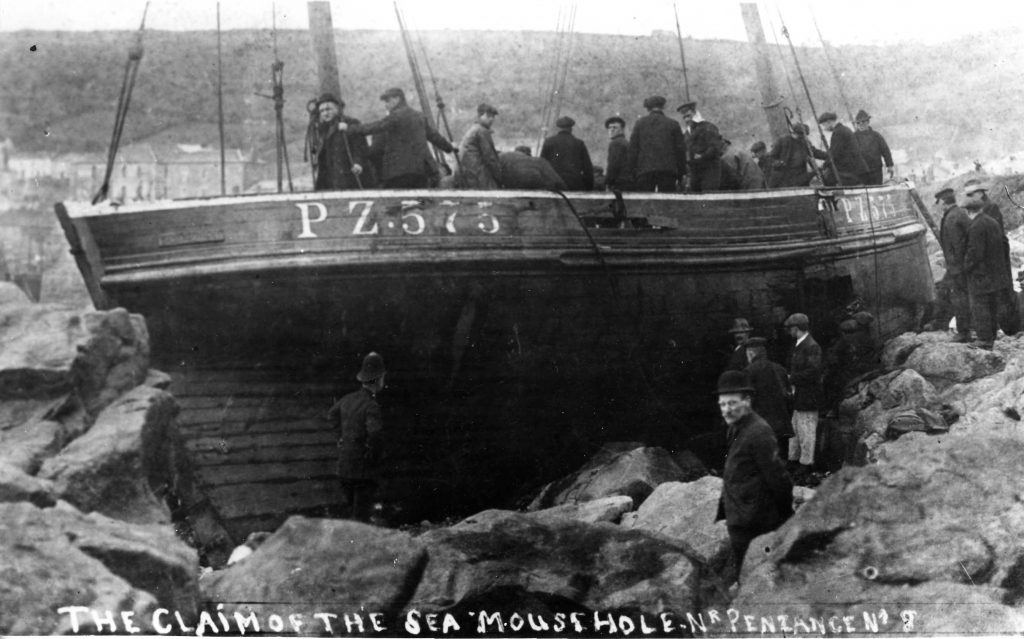
(Unattributed postcard of the wreck)
At the height of the spring mackerel season a severe gale swept across the Westcountry, catching most of the big Mousehole luggers in harbour, but with the baulks up! The wave surge from this storm, broke many boats from their moorings, and dragged the big motor-lugger Emblem out of the harbour and throwing her ashore on the rocks under Carn Topna to become a total wreck.
The lugger Percy also parted from her moorings, and was driven against the pier, sustaining damage to her rail, but was prevented in the nick of time going outside.
Cornishman, Thursday, April 2nd, 1914
Julius Pender was only skipper for about six months, and he was replaced by Thomas Matthews in June 1914, just weeks before the declaration of war. Thomas was possibly a Naval Reservist, as he was replaced by Richard Cornish (55), in December, 1914.
While some degree of fishing out of Mousehole, Newlyn and Porthleven continued throughout the war, reports of the success or otherwise of individual boats dried up for the duration. The Percy may have continued fishing in 1915, but there is no confirmation of this in the papers.
MOUSEHOLE: The most disappointing herring season for many years is being brought to a premature conclusion, owing to the continued unfavourable weather. Some of the large motor drifters are removing herring gear, and either replacing with mackerel nets and footlines, or boulters for long line fishing, between the Wolf and the Scilly Islands.
Cornishman, Thursday, January 21st, 1915
Within weeks there was considerable distress in the fishing communities, which was aggravated by the fishermen being unable to prosecute fishing in Plymouth waters in consequence of military operations. From Newlyn and Mousehole 200 fishermen had been called up for service, and twenty or thirty families in each place were seriously affected by the war. Although her fishing certificate was recorded as current in 1915, the Percy may actually have been laid-up later in the year. Defence of the Realm Regulations relating to fishing etc., were published by the Naval C. in C., Plymouth at the end of May 1915.
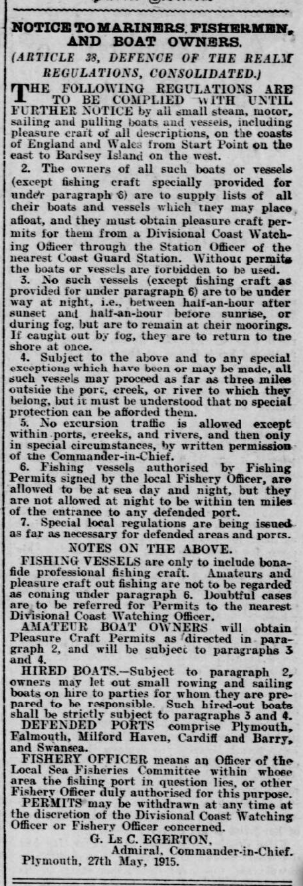
Whatever the local restrictions, and availability of crew, early in 1916 the Percy was sold to Whitby owners, and her Penzance registration was closed with the final endorsement:
Cancelled 22/2/16. Sold to Whitby.
CRO/MSR/PENZ 9 folio 188
Despite the war-time reporting restrictions, the boat’s imminent arrival at Whitby drew the attention of a local correspondent in May:
ANOTHER STAITHES MOTOR BOAT: The Percy, now on her way to Whitby, has been bought in Newlyn by Mr. T. Verrill, of Staithes. She started her career as the Annie Jane. She has been re-fitted with shorter masts, the foremost one moved further aft, and has had a motor put in her, and a new wheel-house for steering. She is the boat which figures in Stanhope Forbes’ picture, “Good-bye! Off to Skibbereen,” which was exhibited in the Royal Academy in 1901, and has been reproduced at the Art Union of London, by Mr. C. O. Marry. In the picture she is seen with P.Z. 614” on her bows, four men and a boy are hauling up the sails, another boy is waving his cap by way of farewell to an old man and two women in a small boat on the foreground, and in the background the cottages of Newlyn are smoking under the hill. Mr. Nicholas Cornish, a Mousehole man, now living at Staithes, will bring her to Whitby.
Whitby Gazette, Friday, May 5th, 1916
The sense of anticipation continued the following week:
The Percy, the new Staithes motor-boat, which arrived in Whitby last week, has indeed an interesting record, and will give quite a sentimental interest to her career locally. One can imagine that many visitors in the summer season will be interested to know that the craft, whose graceful lines will, it is hoped, be the subject of comment, as she enters and lies at the port, possess much artistic interest as the subject of the well-known picture by Stanhope Forbes. One would gladly see more of these gracefully-modelled craft round about the coast, and I hope that builders of new craft will seek to emulate the designs of the characteristic Penzance-men.
Whitby Gazette, Friday, May 12th, 1916
Having waxed lyrical on her arrival, with the war raging the local papers then had more important matters to report than the comings and goings of a mere fishing boat, and her subsequent career remains to be discovered.
| Registered dimensions | 19/07/1906 |
|---|---|
| Length of Keel (ft.) | 47.0 |
| Length (ft.) | 50.4 |
| Breadth (ft.) | 14.8 |
| Depth (ft.) | 7.0 |
| Tonnage – Tons Gross | 33.0 |
| Tonnage – Net reg. | 33.0 |
| Number of crew | 6 men |
| 0 boys |
Tony Pawlyn
31 May 2020
